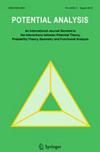论 M. Riesz 谐函数的共轭函数定理
IF 0.8
3区 数学
Q1 MATHEMATICS
引用次数: 0
摘要
让(L^p(\textbf{T})\)是定义在单位圆\(\textbf{T}=\{z: |z|=1\}\subseteq \mathbb {C}\)中的复值函数的莱斯贝格空间。在本文中,我们要解决的问题是找到形式为: $$ \Vert f\Vert _{L^p(\textbf{T})}\le A_{p,b} 的不等式中的最佳常数。\Vert (|P_+ f|^2+b| P_{-} f|^2)^{1/2}\Vert _{L^p(\textbf{T})}.这里的 \(p\in [1,2]\), \(b>0\), 以及 \(P_{-} f\) 和 \( P_+ f\) 表示函数 \(f\in L^p(\textbf{T})\) 的共解析投影和解析投影。常数 \(A_{p,b}\)的尖锐性是通过取一个族类准调和映射 \(f_c\)并让\(c\rightarrow 1/p\) 得出的。这个结果扩展了 Pichorides 和 Verbitsky 的 M. Riesz 共轭函数定理的一个尖锐版本,以及一些著名的全形函数估计。本文章由计算机程序翻译,如有差异,请以英文原文为准。
On M. Riesz Conjugate Function Theorem for Harmonic Functions
Let \(L^p(\textbf{T})\) be the Lesbegue space of complex-valued functions defined in the unit circle \(\textbf{T}=\{z: |z|=1\}\subseteq \mathbb {C}\). In this paper, we address the problem of finding the best constant in the inequality of the form:
$$ \Vert f\Vert _{L^p(\textbf{T})}\le A_{p,b} \Vert (|P_+ f|^2+b| P_{-} f|^2)^{1/2}\Vert _{L^p(\textbf{T})}. $$Here \(p\in [1,2]\), \(b>0\), and by \(P_{-} f\) and \( P_+ f\) are denoted the co-analytic and analytic projections of a function \(f\in L^p(\textbf{T})\). The sharpness of the constant \(A_{p,b}\) follows by taking a family quasiconformal harmonic mapping \(f_c\) and letting \(c\rightarrow 1/p\). The result extends a sharp version of M. Riesz conjugate function theorem of Pichorides and Verbitsky and some well-known estimates for holomorphic functions.
求助全文
通过发布文献求助,成功后即可免费获取论文全文。
去求助
来源期刊

Potential Analysis
数学-数学
CiteScore
2.20
自引率
9.10%
发文量
83
审稿时长
>12 weeks
期刊介绍:
The journal publishes original papers dealing with potential theory and its applications, probability theory, geometry and functional analysis and in particular estimations of the solutions of elliptic and parabolic equations; analysis of semi-groups, resolvent kernels, harmonic spaces and Dirichlet forms; Markov processes, Markov kernels, stochastic differential equations, diffusion processes and Levy processes; analysis of diffusions, heat kernels and resolvent kernels on fractals; infinite dimensional analysis, Gaussian analysis, analysis of infinite particle systems, of interacting particle systems, of Gibbs measures, of path and loop spaces; connections with global geometry, linear and non-linear analysis on Riemannian manifolds, Lie groups, graphs, and other geometric structures; non-linear or semilinear generalizations of elliptic or parabolic equations and operators; harmonic analysis, ergodic theory, dynamical systems; boundary value problems, Martin boundaries, Poisson boundaries, etc.
 求助内容:
求助内容: 应助结果提醒方式:
应助结果提醒方式:


